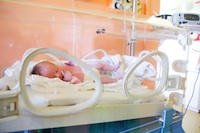
Doctors across the country are witnessing a resurgence in opiate use among pregnant mothers and it has the medical community looking for solutions.
According to an article recently published on Philly.com, the numbers on opiate-addicted newborns are truly frightening. In 2000, 8,000 births occurred where some sort of exposure of the infant to opiates occurred prior to birth. Half needed treatment for withdrawal symptoms.
By last year, that number had risen to 50,000 with some 23,000 newborns suffering the effects of opiate withdrawal.
Interestingly, the problem grew both in volume as well as range. Long thought to be an “urban” problem, opiate use has spread from cities to suburbs, and from suburbs all the way to farms. The article states that Dartmouth-Hitchcock Hospital in New Hampshire; a hospital that treats a rural population, sees close to a 10 percent addiction rate in its newborns.
Opiates, not to be confused with opioids which are a class of prescription medication, include illicit drugs like heroin, morphine, opium, and methadone. Once used in various forms in the 1800’s to treat everything from teething to women’s menstrual symptoms, opiates are now considered to be illegal drugs across the United States and in many countries around the world.
Now doctors are using the work done by pioneering Philadelphia physician Dr. Loretta Finnegan, MD in 1970 to figure out how to treat addicted babies in the 21st century.
Finnegan’s research helped to determine which babies were suffering withdrawal shortly after birth. Once the addicted babies could be identified, Finnegan developed a treatment protocol to determine the level of addiction and the proper procedure to wean them off of the drugs.
At the same time, Finnegan developed a treatment program for the mothers to try to help break the cycle of addiction and ensure that they would no longer inflict this kind of harm on themselves or any other babies they may conceive in the future. Finnegan’s program, once known as the Thomas Jefferson Hospital Family Center Program, still exists today. It currently goes by the name of the Maternal Addiction Treatment Education and Research Program.
As opiate addiction continues to grow and mothers continue to inflict untold amounts of pain on their newborn babies, work conducted some 45 years ago continues to play a critical role in shaping our response today.
